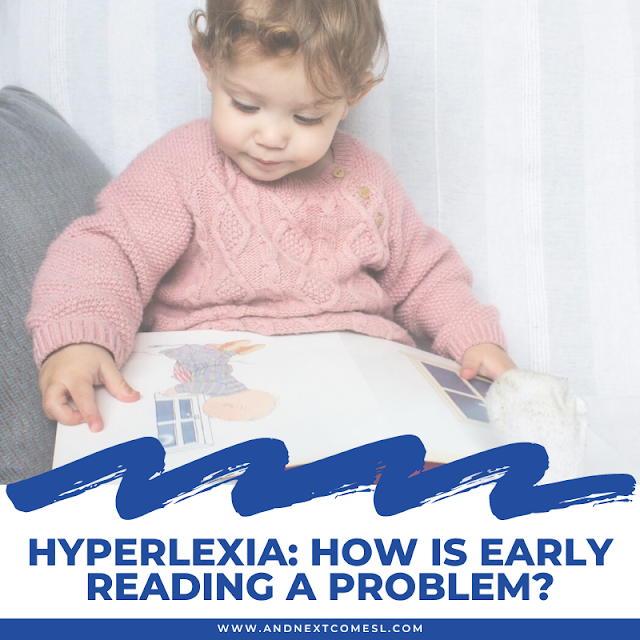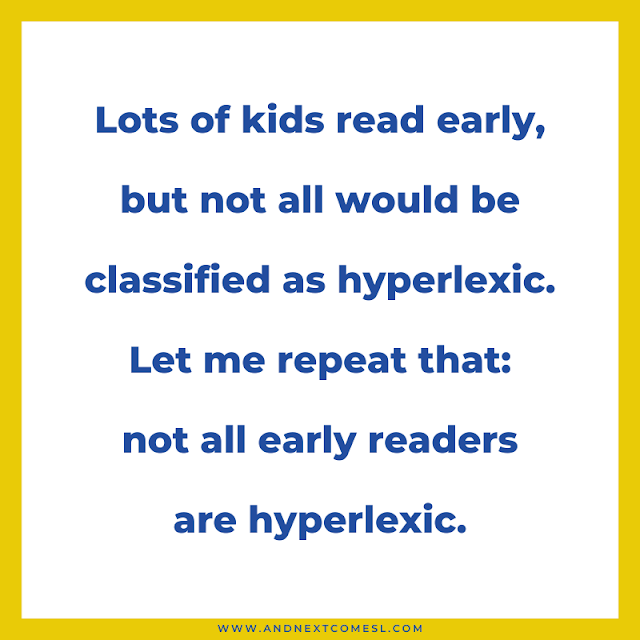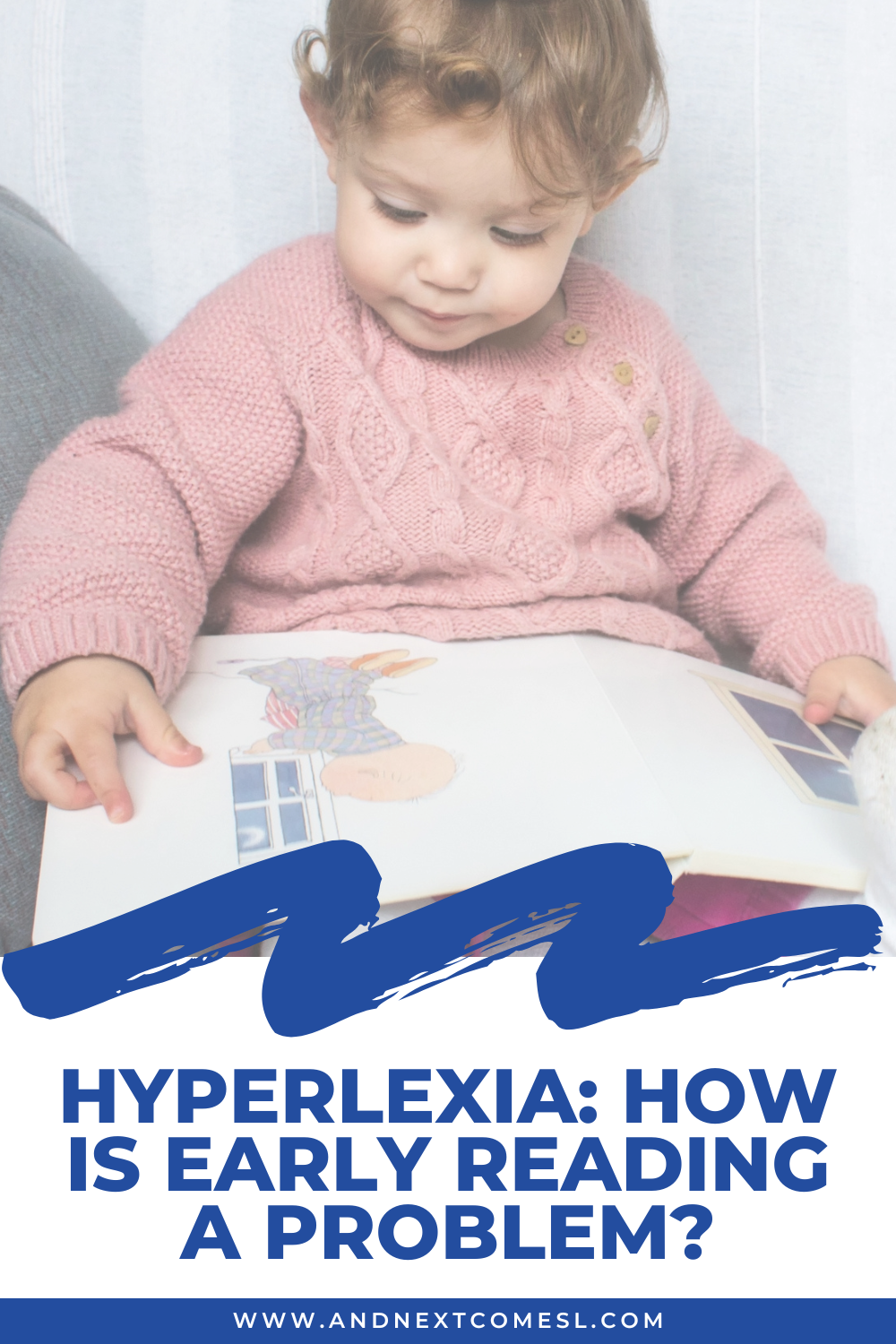There was a discussion about hyperlexia in a Facebook group where the person was seeking more information about hyperlexia and what it is. More specifically, though, they were trying to understand how early reading could possibly be viewed as a problem.
It was a good question. (And one, I hadn't really seen before either. What can I say? I like new questions.)
Now, first things first, it's important to understand that the early reading of hyperlexia itself isn't the issue per se.
Either is the intense fascination with letters. Although there are some "professionals" who will try to tell you it is and, therefore, you should discourage it or take their letters away. Please don't listen to this advice. See why here.
Anyway, so, what exactly is the problem here then? Why is it important to identify hyperlexia at all? Why are we slapping a label on this remarkable ability to read?
Well, the thing is, hyperlexia is so much more than just early reading. And it's more than just an intense fascination with letters.
There are issues and challenges that come along with this precocious self-taught reading ability and there are areas where hyperlexic learners need extra support. That's what we're going to explore here. So let's dig in and answer: how is early reading a problem?
Incomplete Definitions of Hyperlexia Might Be Leading to Confusion
It's quite possible that a lot of the confusion around hyperlexia is that, oftentimes, people are given incomplete (or even incorrect!) definitions about what hyperlexia is in the first place.
Too often, people assume that hyperlexia just means early reading. But there's so much more to hyperlexia than that.
Defining hyperlexia in such a simplistic manner fails to capture the difficulties that can accompany hyperlexia and minimizes the experiences of hyperlexic individuals.
Instead, hyperlexia is defined by three main traits or characteristics, one of which is the early ability to read. The other two traits that often get left out of definitions - or overlooked - are the difficulties in acquiring, understanding, and using language and the difficulties with social interactions. In other words, language differences and social differences.
It's these two other groups of traits that really define the issues, problems, or challenges that come along with hyperlexia. And that's precisely what the person in the Facebook group was really trying to discover and learn about.
In other words, it's not the early reading that necessarily causes problems (although the intensity of their interest in the written word can be overwhelming for many parents!). Instead, it's the difficulties with language and social skills that can lead to challenges or require extra support that are often deemed the "problems" of hyperlexia.
So...What are the Issues that Accompany Hyperlexia?
It's also helpful to keep in mind that hyperlexic kids learn language differently. They are gestalt language processors, for starters. And most of the challenges that come along with hyperlexia have to do with language skills (see a full list here) and, sometimes, even their spiky learning profile.
Here are just some of the issues or challenges that are common in hyperlexia:
- Comprehension issues
- Difficulties understanding and answering WH questions (i.e., who, what, where, when, etc. questions)
- Auditory processing issues (i.e., difficulties processing what is said to them, which is why they're often described as selective listeners)
- Difficulties with abstract language and inferencing
- Picking up language and/or grammar rules doesn't come easy or naturally so they need to be taught specifically
- Difficulties formulating thoughts and expressing oneself (not only through spoken words, but through written/printed or gestural as well)
Decoding the written word comes easy to hyperlexic learners, but understanding and using the language around them doesn't.
So you can see how it might be challenging to carry on a conversation when you find it difficult to answer questions, formulate a response, or understand what is being spoken or communicated.
It's also worth noting that these issues might play a role in other difficulties that hyperlexic children have, such as why they "rarely initiate social conversation" (source: What is Hyperlexia?) and have difficulties with social skills. They might not be able to pick up on the social cues, for instance.
How to Separate Early Reading from Hyperlexia
Lots of kids read early, but not all would be classified as hyperlexic. Let me repeat that: not all early readers are hyperlexic.
But how can you tell? Well, on a basic level, if your early reader's decoding levels match their comprehension levels, then they're likely just an early reader. However, if there is a big gap between decoding and comprehension levels, then it's hyperlexia. To get a more in-depth understanding of hyperlexic versus precocious reading, read about the differences here.
Now, differentiating between the two is incredibly important because hyperlexic readers often require extra support with language and social development and face difficulties with comprehension. And that's the "problem," so to speak, with hyperlexia.
Other early readers, on the other hand, do not experience difficulties with these areas and develop more typically. So they often don't require extra support (aka there are no ongoing "problems").
How is Early Reading a Problem? A Quick Recap
As was touched on, there is a lot of confusion surrounding hyperlexia, with people incorrectly assuming that all early readers are hyperlexic. And a lot of that confusion comes from incomplete or incorrect definitions of hyperlexia that are, unfortunately, being shared. Especially lately on social media.
But hyperlexic readers differ from other early readers. Our hyperlexic learners need support with language and social skills development and that's where the "problems" lie.
So it's not the early reading that's a problem. It's just that hyperlexia comes along with some unique challenges that can make communicating and interacting with others quite difficult. Something that other early readers don't necessarily experience. And that's why it's important to not only identify hyperlexia, but separate it from other precocious readers.











